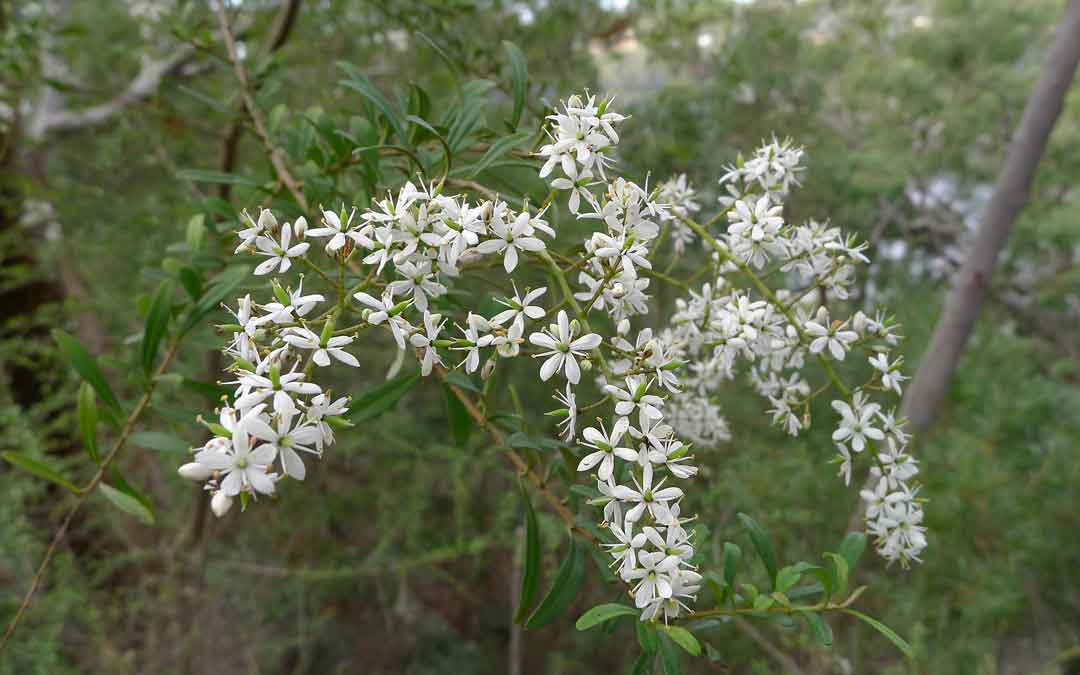Wonderful wildlife plants series: Sweet Bursaria

Are you looking to boost biodiversity and add a touch of native beauty to your garden? A Sweet Bursaria (Bursaria spinosa) or two would be a great addition. This indigenous small to medium-sized shrub is a powerhouse when it comes to supporting local wildlife – especially butterflies – and enhancing the biodiversity of our area. And did I mention that it smells divine?
Macleod is teeming with diverse flora and fauna, and Sweet Bursaria is a key plant in our native ecosystems. It is crucial to the survival of the critically endangered Eltham Copper Butterfly. You can read more about their symbiotic relationship with Notoncuos ants in this previous story.
Sweet Bursaria produces small white heavenly-scented flowers prolifically throughout summer, attracting many types of pollinators – particularly butterflies and Australian bees. As insects fly from flower to flower, they pollinate not only the Sweet Bursaria but other plants including fruit and vegetables that benefit from pollination. Plants such as zucchinis and pumpkins need their pollen transferred from the male flowers to the female ones to produce fruit. So planting pollinator plants nearby – particularly excellent ones like Sweet Bursaria – will help you produce a bigger crop.
Sweet Bursaira is a hardy shrub that provides food and habitat for a range of wildlife, not just insects. Its dense prickly foliage offers shelter and nesting sites for small birds, while its berries provide a nutritious snack for birds and other wildlife such as possums.
Sweet Bursaria is also excellent for supporting soil stability and erosion control. Its deep root system helps to anchor the soil in place, reducing the risk of erosion and runoff during heavy rains. Sweet Bursarias in other regions can grow to be small trees, but our local ones will stay smaller. It also loves a prune after flowering.
Once established, Sweet Bursaria requires minimal watering, because it has evolved to favour our climate and soil conditions, making it an excellent choice for water-wise gardening. It isn’t picky about soil, nor will it compete with your other plants for nutrients. It’s a long-lived plant, with several individual trees in Melbourne specifically noted by Captain Cook still going strong.
Whether planted as a standalone feature or as part of a local native garden bed, this versatile shrub will provide food and habitat for wildlife, and make a positive impact on our local ecosystem.
If you’re passionate about promoting biodiversity and supporting local wildlife, consider planting a Sweet Bursaria in your garden. With its attractive flowers, heavenly scent, wildlife-friendly features and environmental benefits, it’s a win-win for both you and the birds, butterflies and bees.
Now is a great time to be planting natives. If possible look for a Sweet Bursaria from our local area at one of the indigenous nurseries that cover the Plenty-Yarra catchment area – including La Trobe’s in Bundoora, VINC in Fairfield and Edendale in Eltham.
Written by Jen Willis
Photo by John Tann from Sydney, Australia, CC BY 2.0, via Wikimedia Commons
